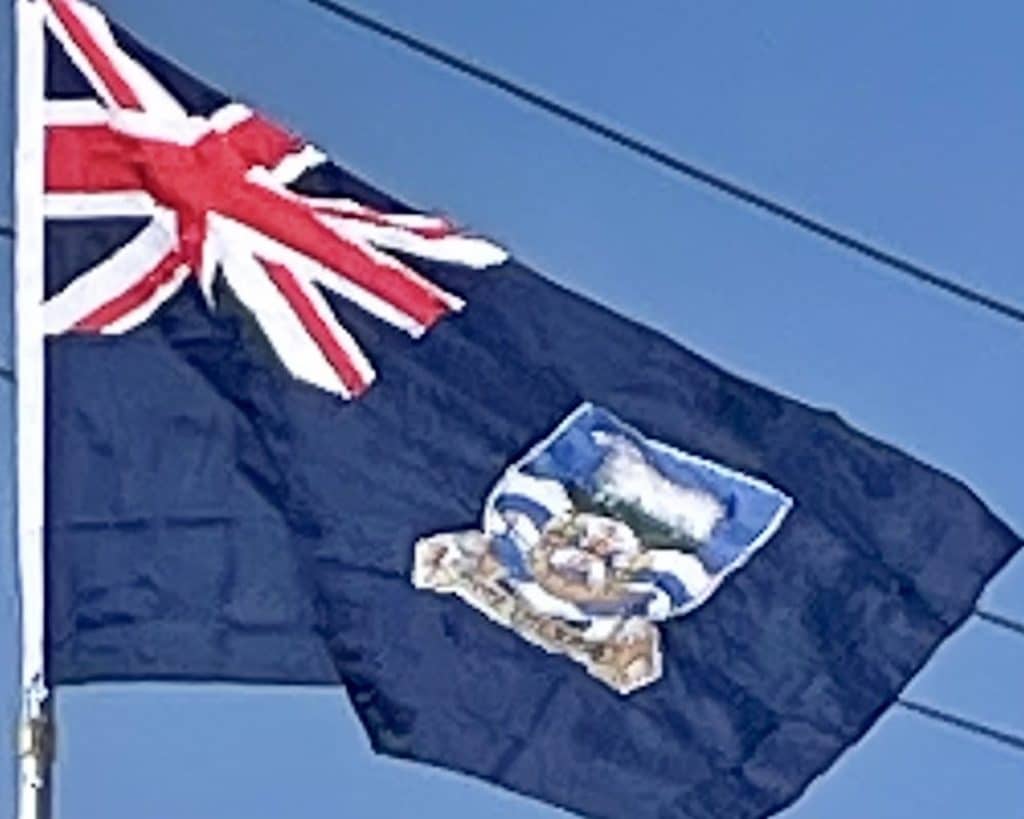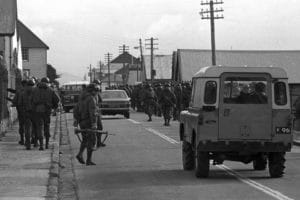

Falkland Islands
In the first half of the 20th century, the Falklands served an important role in Britain’s territorial claims to subantarctic islands and a section of Antarctica. The Falklands governed these territories as the Falkland Islands Dependencies starting in 1908, and retained them until their dissolution in 1985. The Falklands also played a minor role in the two world wars as a military base aiding control of the South Atlantic. In the First World War Battle of the Falkland Islands in December 1914, a Royal Navy fleet defeated an Imperial German squadron. In the Second World War, following the December 1939 Battle of the River Plate, the battle-damaged HMS Exeter steamed to the Falklands for repairs. In 1942, a battalion en route to India was redeployed to the Falklands as a garrison amid fears of a Japanese seizure of the archipelago. After the war ended, the Falklands economy was affected by declining wool prices and the political uncertainty resulting from the revived sovereignty dispute between the United Kingdom and Argentina.
Simmering tensions between the UK and Argentina increased during the second half of the century, when Argentine President Juan Perón asserted sovereignty over the archipelago. The sovereignty dispute intensified during the 1960s, shortly after the United Nations passed a resolution on decolonization which Argentina interpreted as favorable to its position. In 1965, the UN General Assembly passed Resolution 2065, calling for both states to conduct bilateral negotiations to reach a peaceful settlement of the dispute. From 1966 until 1968, the UK confidentially discussed with Argentina the transfer of the Falklands, assuming its judgement would be accepted by the islanders. An agreement on trade ties between the archipelago and the mainland was reached in 1971 and, consequently, Argentina built a temporary airfield at Stanley in 1972. Nonetheless, Falklander dissent, as expressed by their strong lobby in the UK Parliament, and tensions between the UK and Argentina effectively limited sovereignty negotiations until 1977.
Concerned at the expense of maintaining the Falkland Islands in an era of budget cuts, the UK again considered transferring sovereignty to Argentina in the early Thatcher government. Substantive sovereignty talks again ended by 1981, and the dispute escalated with passing time. In April 1982, the Falklands War began when Argentine military forces invaded the Falklands and other British territories in the South Atlantic, briefly occupying them until a UK expeditionary force retook the territories in June. After the war, the United Kingdom expanded its military presence, building RAF Mount Pleasant and increasing the size of its garrison. The war also left some 117 minefields containing nearly 20,000 mines of various types, including anti-vehicle and anti-personnel mines. Due to the large number of deminer casualties, initial attempts to clear the mines ceased in 1983. Demining operations recommenced in 2009 and were completed in October 2020.

Based on Lord Shackleton‘s recommendations, the Falklands diversified from a sheep-based monoculture into an economy of tourism and, with the establishment of the Falklands Exclusive Economic Zone, fisheries. The road network was also made more extensive, and the construction of RAF Mount Pleasant allowed access to long haul flights. Oil exploration also began in the 2010s, with indications of possible commercially exploitable deposits in the Falklands basin. Landmine clearance work restarted in 2009, in accordance with the UK’s obligations under the Ottawa Treaty, and Sapper Hill Corral was cleared of mines in 2012, allowing access to an important historical landmark for the first time in 30 years. Argentina and the UK re-established diplomatic relations in 1990, but neither has agreed on the terms of future sovereignty discussions. Disputes between the governments have led “some analysts [to] predict a growing conflict of interest between Argentina and Great Britain … because of the recent expansion of the fishing industry in the waters surrounding the Falklands”.